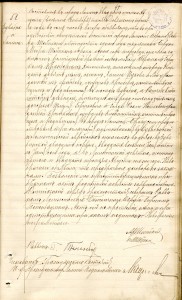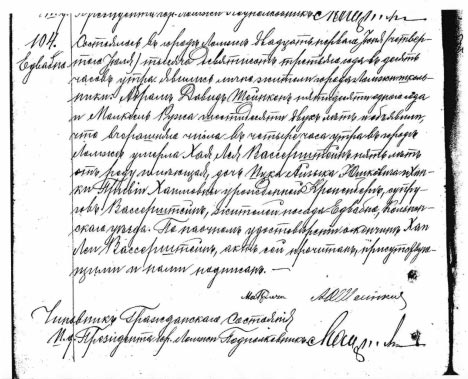On the first pages of My Father’s Wars, I note that I have little to no information on family history that preceded my father’s birth (p. 9): “the personal remnants of that part of my family’s past are gone….” But that statement is not entirely true. In what follows, I describe how I came upon a document—a small part still left of Mendeleh’s family past. This little story illustrates why a project like this may never end, regardless if a book or an article is finalized and published. There is still more to uncover, even if I am not sure how it fits into the larger project or if it suggests a different kind of project.
Chaja Leja
In the course of interviewing my father, he mentioned having a sister who died before he was born. He said her name was Leah and that he knew nothing more about her. I was not surprised hearing that Priwa lost a child in the early years of the twentieth century. But I was taken aback because of her name—Leah. A decade before hearing about Priwa’s Leah, I had named my own daughter Leah. When this grandchild was born, my father did not say a word about having a sister by that same name. Did the connection not enter his mind? Had he forgotten about that long-deceased sister? Did my English-American, Hebrew-pronunciation of the name Leah look and sound too different from his “Leah”? At the time of my Leah’s birth, did he think it bad luck to mention the dead? He couldn’t (wouldn’t?) explain why he never before mentioned having a sister named Leah.
In early 2012, I received an email from a man who offered to get information on my family from Poland that I would have difficulty getting on my own. He sent me this message:
I have a contact in the archives I get records from…Now, looking at Wasersztejn, there is this record which clearly pertains to your family, and could add info on grandfather, mother’s maiden name, and mother’s father’s first name if you’re lucky… WASSERSZTEJN Chaja Leja 1903 D 104 Ick Ajzyk
Six months later, I received the document:
The man said he has a translator who said the key elements of the document are as follows:
1903 Łomża D#104 Extract – Chaja Leja Wassersztejn
Reported: July 4th (June 21, Julian),
1903 Deceased: Chaja Leja Wassersztejn, age 5 years
Parents: Ick Ajzyk Juszkowicz & Chinka Prya [??] Chaimowna née Kronenberg,
Spouses Wassersztejn,
Residents of Jedwabne
Survived by: Only the parents are mentioned
Date of Death: July 3rd (June 20, Julian), 1903 in Łomża
Witnesses: Abram Dawid Szejnkop, age 51, a sexton Malkiel Ruża, age 62, a sexton
This information is consistent with what my father told me: Leah (Chaja Leja) died (1903) before Mendeleh was born (1913).
I experienced a thrill receiving this document and translation. It was “data” that affirmed a piece of my father’s story. The man with access to the archives found me because someone sent him a 2005 article I wrote in the scholarly journal Anthropological Quarterly (AQ). In none of my writings was there any mention of my father’s sister Leah (Chaja Leja) whose death certificate the man with the archives sent me.
Chinka Prya
In my 2005 AQ article, I referred to my father’s mother as “Riva.” In his email to me, my archives contact had this to say about my grandmother’s first name:
Here’s what my translator wrote when I asked him to double-check the name you know as Riva. Makes total sense. Take note that some of these cursive Russian records are not easy to decipher precisely.
[Quoting the translator]: I know it’s a strange name, but there’s a “P” in front of the “r”. I am reading the ending of the name as having one of the Russian versions of “y” (“bi”). If I’m wrong, it could be Priwia. I could certainly see how someone named Chinka Prya [correctly or otherwise] might use Riva. If not for the very clear “P”, it could have been a form of Riva.
This tidbit is also consistent with information I received from my father, which appears in My Father’s Wars as follows (p. 2):
“My mother was Priwa,” he said. “Sometimes they called her Riva, but she was Priwa, you know, Priwa,” he repeated, impatient that I wanted to know why she was sometimes called Riva.
Chinka Prya Chaimowna née Kronenberg
There is also the matter of Priwa’s maiden name that I address in the book as follows:
Mendel believed the Kromberg side is rooted in nobility, outside of Poland. “The name of Kromberg is blue blood. Blue blood. From a special race” (p. 3, My Father’s Wars).
My archives contact also asked his translator about the name “Kronenberg,” knowing I refer to Priwa’s maiden name as “Kromberg.” According to the translator:
The family name may have been Kromberg or Kronberg or maybe Kroneberg, but this record very clearly lists the name as Kronenberg. There just isn’t any doubt about it. It’s not like the problem with Chinka’s 2nd name. I don’t know if the clerk messed up, if the family used several versions of the surname, or if it was something else.
Unfinished business
I wonder if this little document—and the fact it is now getting posted on the Internet—may lead to additional discoveries. In the meantime, I have reached out to colleagues to confirm the translation. One colleague wrote, “It was very difficult indeed to distinguish the hand writing. I asked for help from my half Russian friend, and she said that actually it’s Ukrainian. Based on her knowledge of Russian, she said that the paper says, “… citizen Xaia Leia Vostermine (or Vasermtein) died yesterday at 4 AM…”
I then asked for help from a colleague from Ukraine, who wrote,
The document is in Russian but I can do it. I think it is an older version of Russian (staro-Russian) therefore the person confused it with Ukrainian. The handwriting is not very clear (as you can see all letters look alike so it is hard to differentiate, especially when it comes to proper nouns) and I am not able to understand a few words…
Appeared/arrived to the city of Lomzhi (the handwriting is not too clear, so I am not too sure if it is the name) on June 21st/July 4th (I think the person uses here two dates as in Ukraine/Russia, they used two different calendars –the difference between them was 14 days) 1903 at 9 am. The inhabitants of this city of Lomzhi came personally to me. Abram David Toikon (31 years old) and Malkin Ruzha (62 years old) came to tell me that Khoia Leia Rasserttoyn yesterday at 4 am in the city of Lomzhi. She was a daughter of Puka Aizika Yutkovicha (not sure about the name as it is not clear, but this is her father) and Khipka Privun Khattovni (not sure about the name as it is not clear, but this is her mother), who was born (here they tell her parents’ names and the city where she was born, unfortunately I cannot understand everything, so I will just put what I think it is). The city name is Edvabn, Kolporskiy district.
The last sentence says that it is basically her death certificate and the two people who came to him read this document and signed. At the end is his name and signature. I think this is the way they used to create death certificates. This is an older version of Russian and the names are very old (we do not use them in Ukraine any more) and it is very hard to understand the handwriting.
Variations of key information from the three translators are as follows:
Chaja Leja Wassersztejn
Xaia Leia Vostermine (or Vasermtein)
Khoia Leia Rasserttoyn
Jedwabne
Edvabn
Ick Ajzyk Juszkowicz
Puka Aizika Yutkovicha
Chinka Prya [??] Chaimowna née Kronenberg
Khipka Privun Khattovni
Addendum: A Genealogical Tidbit
My archival source sends a document I cannot touch though I can see the sepia tones in the jpg he sent. I can only imagine how the original really looks and feels. I can only imagine how the original smells. After all, it is over 100 years old. The actual source of this document remains a mystery as I do not have contact with the person who accesses the document from an archive.
I do have on good authority that the document is in Russian script.
It is a marriage certificate from 1903.

The young married couple was Abram Herszk Kronberg and Raszka Klejnsztejn, according to one translator (a second translator spells the names Abram Gertkom Krongberg and Raska Kleinshtein). Abram was a 29 year old “bachelor” from Jedwabne; his 17 year old bride was born and raised in Lomza.
Abram’s parents were Chaim Ickowicz & Leja Fajbowna, spouses Kronberg.
Raska’s parents were Szmul Herszkowicz & Golda Rochel Notkowna née Krimkiewicz, spouses Klejnsztejn.
There were 3 marriage banns or announcements of the impending marriage in two regional synagogues: it was announced 3 times in Jedwabne (June 21, 28, and July 5, 1903) and 3 times in Lomza (August 9, 16, 23 , 1903).
The wedding was held on September 8th (August 26, Julian), 1903 in Lomza at 7 o’clock in the evening.
Abram, the groom was my father Mendel’s uncle on his mother’s side. He was one of Priwa’s brothers.
The couple figure in my father’s narrative two times. The first time was when the Wasersztejn family was caught in the feverish aftermath of World War I. By then, Avram was a Polish war hero. He and Raska were thriving, according to my father’s account.
“The woman and her five daughters followed Chajcia to the barn, peering at the sick family through a window” (p. 7).
The second time was much later. July 10, 1941 in Jedwabne (p. 86).
But before that date, they looked for help from relatives out of Europe:
“The five sisters from Lomza, the mean Kromberg daughters who walked away from the Wasersteins dying of typhus in a barn—now they wanted help. ‘Can you get us to Cuba?’ they begged. This time the Wasersteins did nothing. It was their turn to look away” (p. 67).
Mendel believed Raska was culpable. He blamed her for neglecting his family in their time of desperate need. He held bitter feelings towards her. Later, when she needed help and Mendel didn’t provide any, did he feel he had himself been neglectful, culpable, responsible? Or did Mendel simply believe Raska and her girls got what they deserved?
These stories beg a series of difficult questions. How do people bear the burdens of these kinds of responsibilities? And why are they put in the position to bear such responsibility in the first place? Does responsibility lie with them? Or does responsibility actually lie elsewhere? Are there forces bigger, wider, more invisible than individuals (and the ethnic groups to which they belong) that turn all of them into collaborators and victims at the same time?
